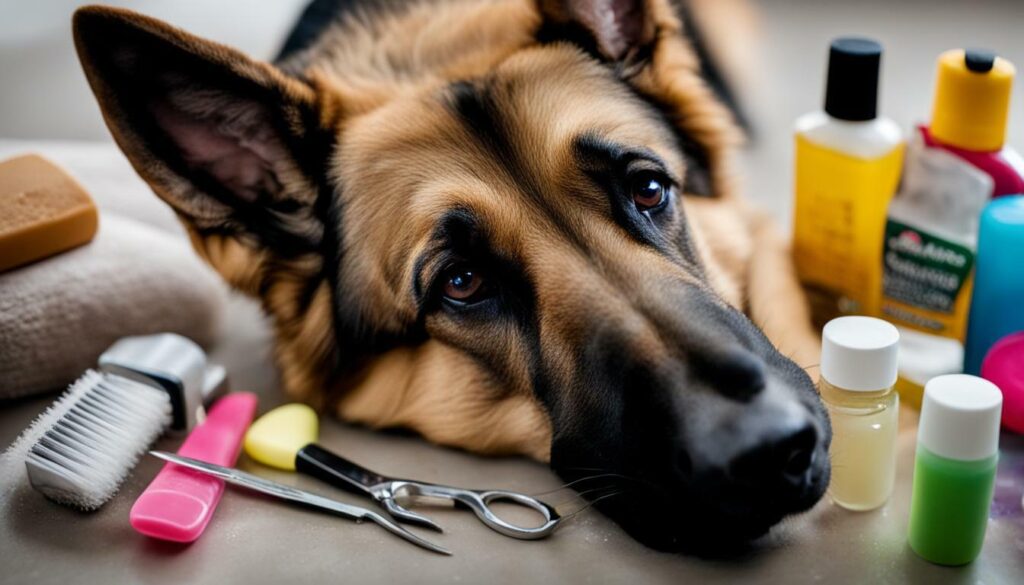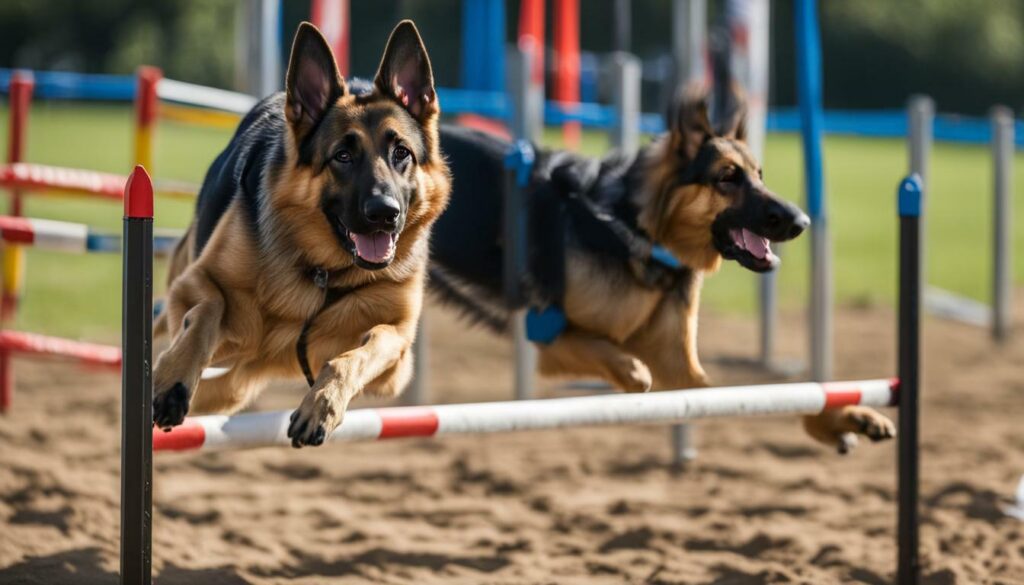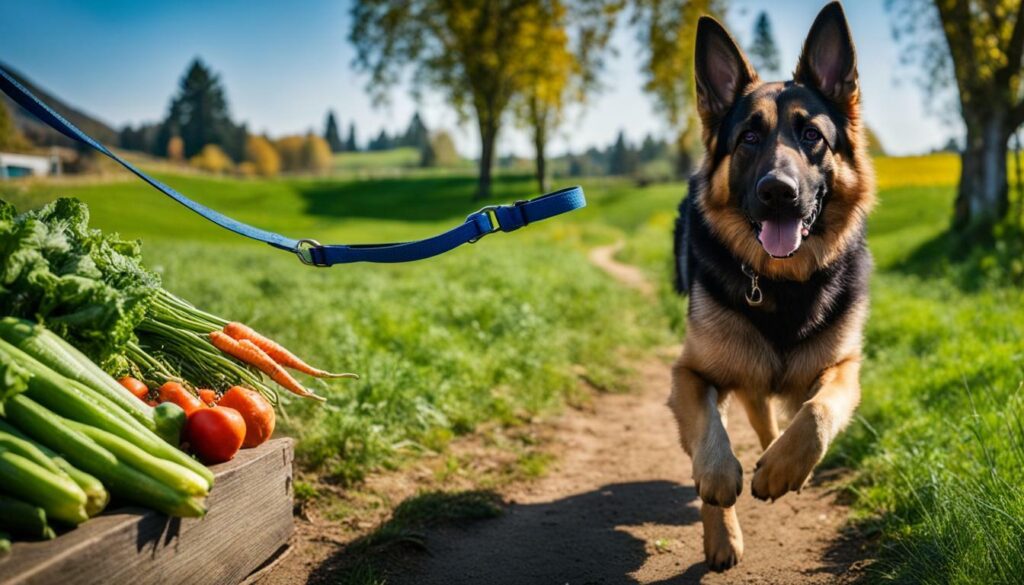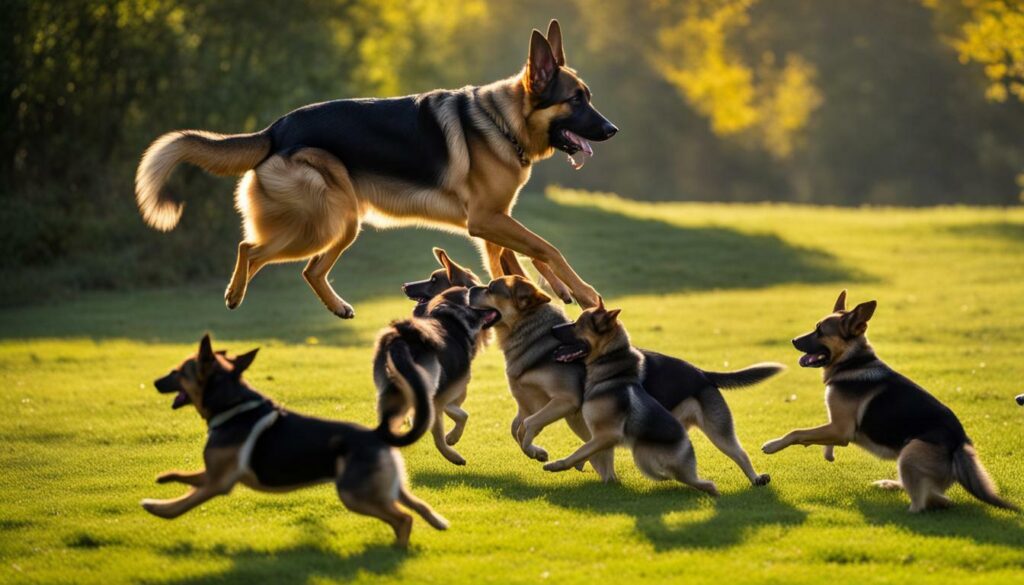Welcome to the ultimate guide to German Shepherd ownership. Whether you’re a first-time owner or a seasoned pro, this comprehensive guide is designed to provide you with all the essential tips and tricks to ensure a successful German Shepherd ownership experience. From caring for your furry companion to training strategies and maintaining their health, you’ll find everything you need to raise a happy and healthy German Shepherd.
- Whether you’re a first-time German Shepherd owner or a seasoned pro, this guide provides essential tips and tricks for successful ownership.
- Understanding the breed characteristics is crucial before bringing a German Shepherd into your home.
- Providing top-notch care, training, and mental stimulation is essential for a happy and healthy German Shepherd.
- Grooming, socialization, and a balanced diet are all crucial elements of German Shepherd ownership.
- Being a responsible owner means prioritizing your German Shepherd’s well-being and providing them with love, care, and the training they deserve.
Understanding the German Shepherd Breed
The German Shepherd breed, also known as the Alsatian, is a muscular and agile dog that originated in Germany in the late 19th century. They are known for their loyalty, intelligence, and versatility. German Shepherds are often used as police dogs, search and rescue dogs, guide dogs, and therapy dogs.
German Shepherds have a distinctive appearance with their pointed ears, dark eyes, and thick, double-layered coat. They come in a variety of colors, including black, red, tan, and sable. The breed typically weighs between 50 and 90 pounds and stands between 22 and 26 inches tall at the shoulder.
German Shepherds have a strong, confident, and self-assured personality. They are protective of their family and can be wary of strangers if not properly socialized. Early training and socialization with other dogs and people is important to ensure that they develop good manners and positive behaviors.
The breed is also known for their high energy levels and require plenty of exercise and mental stimulation. German Shepherds thrive on having a job to do, whether it’s obedience training, agility, or simply playing fetch in the yard.
If you’re considering bringing a German Shepherd into your home, it’s important to understand their breed characteristics and how to meet their specific needs. Proper care, training, and socialization will ensure a happy and healthy life for your furry companion.

Proper care is essential for ensuring your German Shepherd lives a happy and healthy life. Below are some essential German Shepherd care tips to keep in mind:
| Care Area | Tip |
|---|---|
| Feeding | Feed your German Shepherd high-quality dog food that is appropriate for their age, size, and activity level. Follow the recommended feeding guidelines, and avoid overfeeding to prevent obesity. |
| Grooming | Regular grooming is necessary to keep your German Shepherd’s coat healthy and shiny. Brush their coat at least once a week to remove loose hair and prevent matting. Trim their nails regularly, clean their ears, and brush their teeth to promote good oral hygiene. |
| Vaccinations | Stay up-to-date on your German Shepherd’s vaccinations to protect them from common diseases. Talk to your vet to determine a vaccination schedule that is appropriate for your dog. |
| Health Checks | Regular check-ups with your vet are essential for maintaining your German Shepherd’s health. Schedule appointments at least once a year, or more frequently as recommended by your vet. Be alert for any signs of illness or discomfort and seek veterinary care immediately if needed. |
| Exercise | Regular exercise is crucial for keeping your German Shepherd physically fit and mentally stimulated. Aim for at least 30 minutes of exercise per day, such as brisk walking, running, or playing fetch. Consider enrolling your dog in obedience training or agility classes for added mental stimulation and socialization. |

By following these German Shepherd care tips, you can ensure that your furry friend lives a happy and healthy life. Remember, proper care and attention are essential for creating a strong bond with your German Shepherd and ensuring they feel loved and valued.
Training Strategies for German Shepherds
German Shepherds are intelligent, alert, and highly trainable dogs. They excel in various fields, including obedience, agility, and protection work. To ensure your German Shepherd develops good manners and positive behaviors, you need to start training them early and consistently.
One of the most important aspects of German Shepherd training is socialization. Socialization is the process of exposing your dog to various people, animals, and environments, helping them develop confidence and adaptability. It’s crucial to start socializing your German Shepherd puppy as early as possible, ideally between the ages of 3 and 14 weeks.
Positive reinforcement is the best training approach for German Shepherds. Positive reinforcement involves rewarding your dog for good behavior, such as following commands or showing appropriate behavior around people and other animals. Treats, verbal praise, and petting are some of the most effective rewards for dogs.

When training your German Shepherd, it’s essential to be patient and consistent. Dogs thrive on routine, so establish a consistent training schedule and stick to it. Keep training sessions short and engaging, and avoid punishing your dog for bad behavior. Punishment can create fear and anxiety in dogs, leading to more problems in the long run.
Basic obedience commands, such as sit, stay, come, and heel, are fundamental for any German Shepherd. Once your dog has mastered basic obedience, you can move on to more advanced skills, such as off-leash training, agility, and search and rescue work.
If you’re new to dog training, consider enrolling in a German Shepherd-specific training class. These classes can provide you with the necessary knowledge and skills to train your dog effectively and help you bond with your furry companion.
Overall, German Shepherd training requires patience, consistency, and positive reinforcement. With the right approach, your German Shepherd can become a well-behaved and trustworthy companion.
Maintaining Your German Shepherd’s Health
German Shepherds are generally a healthy breed, but like all dogs, they can be prone to certain illnesses and conditions. As a responsible owner, you should prioritize your German Shepherd’s health and well-being by following these tips.
Regular Vet Check-Ups
Just like humans, dogs need regular check-ups with a veterinarian to monitor their health and catch any potential issues early on. Make sure your German Shepherd receives a yearly physical exam and any necessary vaccinations. Additionally, be on the lookout for any changes in behavior or physical symptoms that may indicate an underlying health problem.
Proper Nutrition
A balanced diet is crucial for your German Shepherd’s overall health. Choose high-quality dog food that meets their nutritional needs and avoids fillers or additives that can cause digestive issues or allergies. Additionally, avoid overfeeding your dog and maintain a healthy weight to prevent obesity and related health problems.

German Shepherds are a high-energy breed that requires regular exercise to maintain their physical and mental health. Take your dog on daily walks, provide opportunities for play and exploration, and consider engaging in activities such as agility training or obedience competitions. Additionally, provide your dog with mental stimulation through activities such as puzzle toys or training exercises.
Preventative Measures
Certain health issues can be prevented through proper care and preventative measures. For example, regularly cleaning your German Shepherd’s teeth can prevent dental problems, while treating your dog with flea and tick medication can prevent infestations and related diseases. Additionally, be aware of any breed-specific health issues that may affect German Shepherds, such as hip dysplasia, and take appropriate action to prevent or manage these conditions.
Conclusion
By following these tips, you can ensure that your German Shepherd remains happy and healthy for years to come. Remember to prioritize regular vet check-ups, proper nutrition and exercise, and preventative measures to maintain your dog’s health and well-being.
Understanding German Shepherd Behavior
German Shepherds have a reputation for being intelligent, loyal, and protective. However, like all breeds, they have unique behavioral traits that require proper understanding and management.
One common issue with German Shepherds is separation anxiety. They form strong attachments to their owners and can become distressed when left alone for extended periods. To mitigate this, gradually build up your dog’s tolerance to being alone and provide plenty of mental stimulation when you’re away, such as leaving puzzle toys or turning on calming music.
German Shepherds also have a high prey drive, which means they may chase smaller animals such as cats or squirrels. Socializing your dog from a young age can help to reduce this behavior, but it is important to always supervise and control their interactions with other animals.
Another behavior to watch for is aggression. German Shepherds can be fiercely protective of their family and territory, but this can manifest as aggressive behavior towards strangers or other dogs. Proper training and socialization can help to prevent and manage aggression, but it is important to seek professional help if you suspect your dog is exhibiting aggressive behavior.
Overall, understanding your German Shepherd’s behavior is key to providing them with a happy and healthy life. By addressing any potential issues early on and providing proper training and socialization, you can enjoy a harmonious relationship with your furry friend.

Adding a German Shepherd puppy to your family can be an exciting and rewarding experience. However, it’s important to prepare your home and take necessary steps to ensure your puppy’s safety and wellbeing.
Puppy-proofing your home is crucial to keep your German Shepherd safe and prevent any accidents.
Start by removing any hazardous items that your puppy could chew on or swallow, such as electrical cords, poisonous plants, and small toys. Keep household cleaners and chemicals locked away, and secure any doors or windows that your puppy could escape from.
House training your German Shepherd is an essential part of welcoming them into your home.
Consistency and patience are key to successfully house training your puppy. Establish a routine and take your puppy outside frequently, especially after meals and naps. Praise and reward your puppy when they eliminate outside, and avoid punishing them for accidents inside the house.
Socialization is crucial for your German Shepherd’s development and wellbeing.
Expose your puppy to different people, animals, and environments to promote positive behaviors and prevent aggression. Enroll your puppy in puppy classes and obedience training to teach them basic commands and manners.

Establishing a bond with your German Shepherd puppy is essential to build a strong relationship.
Spend quality time with your puppy, playing and interacting with them to build trust and affection. Provide your puppy with plenty of toys and activities to keep them entertained and mentally stimulated.
By taking these necessary steps, you can ensure a smooth and successful transition for your German Shepherd puppy into your loving home.
A Balanced Diet for Your German Shepherd
A proper diet is crucial for the health and well-being of your German Shepherd. Providing a balanced diet that meets their nutritional needs can help them maintain a healthy weight, prevent health problems, and improve their overall quality of life. Here are some tips for feeding your German Shepherd:
Choose high-quality dog food
Look for dog food that is specifically formulated for large breeds, as German Shepherds have unique nutritional needs. Make sure the food contains high-quality sources of protein, such as chicken, beef, or fish, and avoid foods that contain fillers or by-products. If you’re not sure which food to choose, consult with your veterinarian.
Control portion sizes
German Shepherds are prone to overeating, which can lead to obesity and other health problems. Measure out their food portions according to package instructions, and avoid free-feeding. If your dog is overweight, talk to your veterinarian about a weight loss plan.
Avoid table scraps
While it may be tempting to feed your German Shepherd table scraps, it’s important to resist the urge. Table scraps can disrupt your dog’s digestive system and lead to excessive weight gain. Stick to feeding them high-quality dog food and treats specifically designed for dogs.
Provide fresh water
Make sure your German Shepherd has access to clean, fresh water at all times. Change their water bowl daily and ensure it is large enough for their size.
By following these tips, you can ensure your German Shepherd is receiving a well-balanced diet and the nutrients they need to stay healthy and happy.

German Shepherds are high-energy dogs that require regular exercise and quality mental stimulation. Without proper exercise and stimulation, they may develop destructive behaviors to release their pent-up energy.
The recommended exercise for German Shepherds is a minimum of 30 to 60 minutes per day of moderate to intense physical activity. This can include brisk walks, running, hiking, swimming, or playing fetch in a fenced yard. If possible, you can integrate activities that provide mental stimulation, such as agility training or obedience classes.
It’s essential to tailor physical activity to your dog’s age, fitness level, and health condition. Senior dogs may benefit from gentler activities like slow walks or swimming, while younger dogs may require more challenging activities to keep them engaged and entertained.
Avoid overexerting your German Shepherd, especially during hot weather. Provide plenty of water breaks and rest periods to avoid dehydration and heatstroke.
Aside from physical exercise, your German Shepherd also needs quality mental stimulation to keep their mind active and engaged. Ways to provide mental stimulation include interactive toys, puzzle feeders, hide-and-seek games, and training exercises. You can also teach your dog new tricks or behaviors to challenge their cognitive abilities.
Remember to supervise your German Shepherd during playtime and avoid leaving them unattended with toys that can break into small pieces or cause harm. By providing regular exercise and mental stimulation, you can help your German Shepherd maintain a healthy body and an active mind.

Grooming your German Shepherd is essential for maintaining their coat’s health, minimizing shedding, and reducing the risk of skin infections. Follow these tips to keep your dog looking and feeling their best.
- Brushing: Regularly brushing your German Shepherd’s coat can help prevent matting and remove loose fur. Use a slicker brush or a deshedding tool to get deep into their thick coat. Aim to brush your dog at least once a week, or more frequently during shedding season.
- Bathing: While German Shepherds don’t need frequent baths, it’s essential to keep them clean and fresh-smelling. Use a dog-friendly shampoo and conditioner, and avoid getting water in their ears. Bathing your dog every three to six months should suffice, depending on their activity level and coat condition.
- Nail Clipping: Keep your German Shepherd’s nails trimmed to prevent overgrowth and discomfort. Use a sharp clipper and be careful not to cut the quick, which is a blood vessel that runs through the nail. If you’re unsure how to clip your dog’s nails, consider seeking the help of a professional groomer or vet.
- Ears and Teeth: Regularly clean your German Shepherd’s ears with a damp cloth or cotton ball to avoid ear infections. Brush their teeth several times a week to prevent dental issues, and provide them with dental chews or toys to help keep their teeth clean.
By following these grooming tips, you can help keep your German Shepherd healthy and comfortable. Remember, regular grooming sessions also provide an opportunity for you to bond with your furry friend and reinforce your relationship.

German Shepherds are social creatures that thrive on human interaction but can also be territorial and protective. Proper socialization is essential to prevent aggressive behavior towards people and other animals.
Start socializing your German Shepherd as early as possible by exposing them to various environments, sounds, smells, and sights in a controlled and positive manner. Introduce your dog to friendly people of all ages and genders, other dogs, and animals. Keep interactions brief and positive to avoid overwhelming your dog and causing anxiety or fear.
Positive reinforcement training can also be beneficial in teaching your German Shepherd to respond appropriately in social situations. Reward your dog for good behavior and obedience, and redirect unwanted behaviors with gentle correction and redirection.
Regular exercise and playtime with other dogs can also help your German Shepherd become well-adjusted and socially confident. Consider enrolling your dog in obedience classes or socialization groups to further improve their social skills and obedience.

Remember, socialization is an ongoing process that requires patience, consistency, and positive reinforcement. By providing your German Shepherd with the opportunity to socialize in a safe and positive environment, you can help them develop into a well-behaved and happy companion.
Conclusion: Being a Responsible German Shepherd Owner
Congratulations on becoming a German Shepherd owner! By following the tips and tricks outlined in this comprehensive guide, you are well on your way to providing your furry friend with a happy and healthy life.
Remember that owning a German Shepherd comes with great responsibility. Always prioritize your dog’s physical and emotional well-being, including regular vet check-ups, a balanced diet, and plenty of exercise and mental stimulation.
Recap of Key Points:
- Understanding the German Shepherd breed is crucial for meeting their unique needs.
- Caring for your German Shepherd involves proper nutrition, grooming, and health checks.
- Training your German Shepherd will improve their obedience and behavior, making them a better companion.
- Maintaining your German Shepherd’s health requires preventative measures and early intervention for any potential issues.
- Understanding and managing your German Shepherd’s behavior will create a harmonious environment at home.
- Welcoming a German Shepherd puppy into your home involves puppy-proofing, house training, and socialization.
- A balanced diet and regular exercise are essential for your German Shepherd’s physical and mental health.
- Grooming your German Shepherd involves proper techniques for coat, nail, and ear care.
- Socializing your German Shepherd is necessary for developing positive behaviors and manners.
By following these guidelines and being a responsible German Shepherd owner, you will enjoy a fulfilling and rewarding relationship with your furry companion.
FAQ
Q: What is the German Shepherd breed known for?
A: German Shepherds are known for their intelligence, loyalty, and versatility. They are often used as working dogs in various fields, including law enforcement, search and rescue, and therapy.
Q: How much exercise does a German Shepherd need?
A: German Shepherds are highly active dogs and require regular exercise to stay physically and mentally healthy. They typically need at least 1-2 hours of exercise per day, which can include walks, playtime, and training sessions.
Q: Are German Shepherds good with children?
A: German Shepherds can be excellent family dogs and are known for their protective nature. However, proper socialization and training are important to ensure a good relationship between the dog and children. Always supervise interactions between German Shepherds and young children.
Q: Do German Shepherds shed a lot?
A: Yes, German Shepherds are heavy shedders. They have a dense double coat that requires regular brushing to remove loose hair and prevent matting. Shedding may increase during certain seasons.
Q: How can I keep my German Shepherd’s teeth clean?
A: Regular dental care is essential for your German Shepherd’s oral health. You can keep their teeth clean by brushing them regularly with a dog-friendly toothbrush and toothpaste. Additionally, providing dental chews or toys can help remove plaque and tartar buildup.
Q: Can German Shepherds live in apartments?
A: While German Shepherds are adaptable, they are generally not well-suited for apartment living. They are active dogs that require ample space to move around and regular exercise. A house with a fenced yard is usually more suitable for their needs.
Q: How often should I groom my German Shepherd?
A: German Shepherds require regular grooming to keep their coats healthy. Brushing them at least once or twice a week is recommended to remove loose hair and prevent tangles. They may also need occasional bathing and nail trimming.
Q: Are German Shepherds prone to any health issues?
A: German Shepherds can be prone to certain health issues, including hip and elbow dysplasia, bloat, allergies, and degenerative myelopathy. Regular veterinary check-ups, a balanced diet, and exercise can help maintain their overall health and detect any potential problems early.
Q: How long do German Shepherds typically live?
A: On average, German Shepherds live between 9 to 13 years. However, with proper care, some can live even longer. Providing a healthy diet, regular exercise, and routine veterinary care can contribute to a longer lifespan.
Q: Can German Shepherds be left alone for long periods?
A: German Shepherds are social dogs that thrive on human interaction. They may become bored or anxious if left alone for long periods. It’s recommended to provide them with mental stimulation, such as puzzle toys, and make arrangements for someone to check on them if you need to be away for an extended period.

Marissa Delotta, 36, from Dayton, Ohio, is the creative force behind Roverboard.com, a beloved online destination for dog lovers. As a dedicated mom and canine enthusiast, Marissa combines her family experiences with her love for dogs to offer a platform where dog owners can exchange tips, heartwarming stories, and advice. Her website has become a vibrant community for sharing the joys of dog parenting. In her free time, Marissa enjoys exploring dog parks with her family and volunteering at local animal shelters.